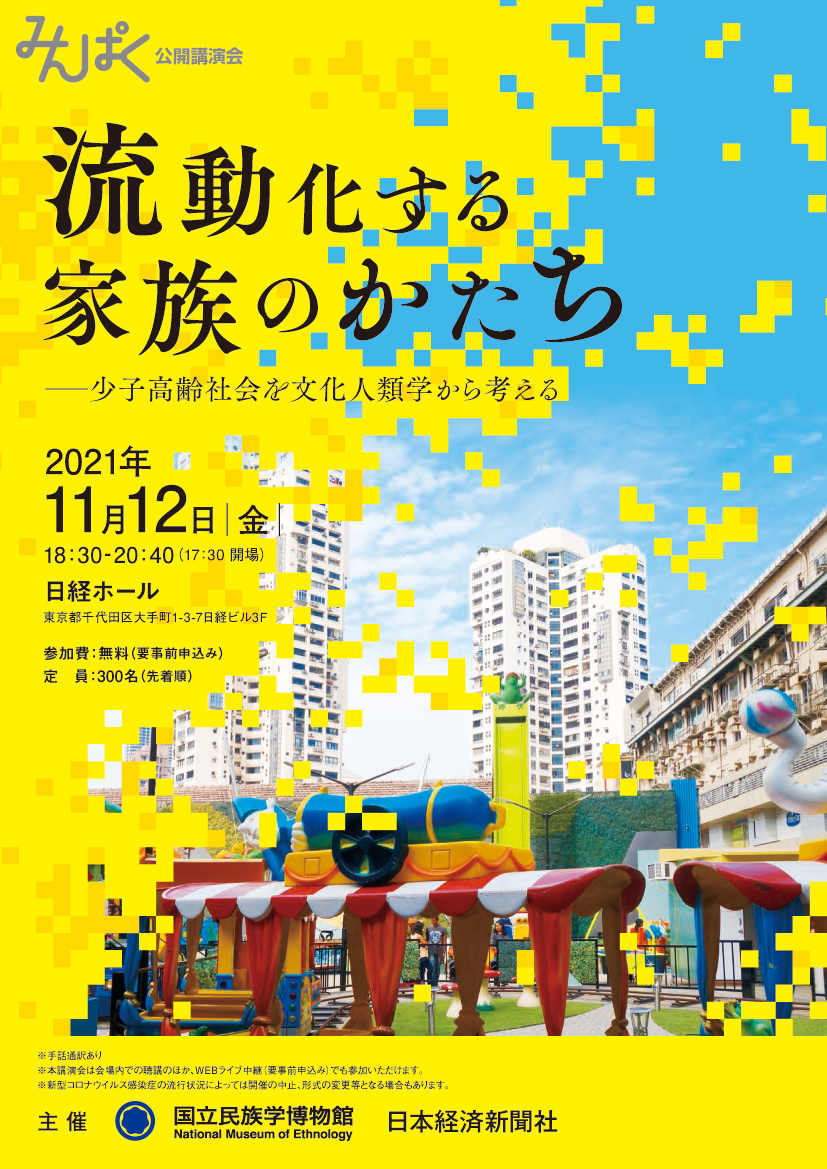Family potential in uncertain times: mobility, technology, and body
Theme Category: Humans 6. Population issues and family/ society
Project Leader: MORI Akiko、NAKAGAWA Osamu
Project Period: April 2021–March 2024
Purpose and content of the project
In the current highly globalized world community, families are far from being stable, but are adaptable and able to make arrangements and adjustments as required. Moreover, the family unit is still regarded as the primary social group. Therefore, this project sheds light on such arrangements and adjustments in different contexts and explores their meaning considering how material, institutional, and body settings interact.
Family forms vary and are changeable. Depending on the situation, a family can change its place of habitation, its members, or functions. Efforts of various researchers to define families notwithstanding, here we consider the work of anthropologists; however, we still do not obtain an indisputable definition of family. A real family might include others as members or get someone else to fulfill some of its functions. By focusing on what a family does, instead of what a family is defined by, we want to explore the family’s fluid way of being. In this project, we focus on various institutions and technologies, as well as the infrastructure that is linked to the subtle arrangements and adjustments within families, such as care networking. If something goes wrong, the dysfunction is made up for by this set of arrangements and adjustments. Remarkably, today, such arrangements and adjustments are increasingly becoming urgent.
This project considers the contemporary world as uncertain. Since the second half of the 20th century, changes in the industrial structure and globalization have radically shaken the political economy and unhinged social systems worldwide. Since the end of the Cold War, we are yet to find a new structure that can maintain the world order. Disaster, wars, and conflicts have displaced a large number of people, increasing the number of refugees and asylum seekers. Additionally, periodic outbreaks of diseases and pandemics have occurred. In this contemporary world, borrowing Doreen Massey’s expression, people are thrown together with other humans and non-humans (rocks, stones, trees, etc.).
Considering these circumstances, in this project, we discard the framework of the family as a group of closely related people. Instead, we illuminate its fluid aspects. Using this approach, we weave together a diverse set of current anthropological themes, from migration, transnationalism, care, and medical and reproductive technology to infrastructure. In other words, we seek to envision the new way of society and family that has emerged in the 21st century.
Anticipated results
An important issue of uncertainty in the modern world is the malfunctioning of the state–market–family linkage, which has been regarded as a foundational mechanism that supports people’s livelihoods. In Japan, for example, the state’s family policy is equipped with various institutions and systems depending on each family’s labor contribution. However, the characteristics of the family model reflected in the policy are far from those actually faced by families. This makes it far more difficult to overcome the problems of an aging society with a rapidly declining birthrate. Against this background, it is preferable to formulate a new policy that is more suitable for actual family life. However, this is not easy because many of the institutions and systems are interlinked. In this study, we will suspend the dual thinking of family/society and illuminate the border zones of family life, where material, institutional, and body settings are contingently arranged. The globalizing world community is, on the one hand, fragile and, on the other, full of unpredictable encounters, and there is a new way of relatedness emerging that we are interested in. Based on ethnographic research, we develop an international discussion to contribute to the possibility of a new reality.
Minpaku Public Lecture
November 12(Friday), 2021, 18:30 to 20:40
Minpaku Public Lecture:
Families in flux: anthropological perspectives on the declining birthrate and aging society
Venue Nikkei Hall

Download[PDF:1.2MB]
(Japanese only)
Program
| 18:30 | Opening address/ TSUGAWA Satoru (Nikkei, Inc. Osaka Head Office) |
|---|---|
| 18:35 | Greeting/YOSHIDA Kenji (Director-General, National Museum of Ethnology) |
| 18:40 | Lecture1/MORI Akiko (Professor, National Museum of Ethnology) |
| 19:10 | Lecture2/ MATSUO Mizuho(Associate Professor, National Museum of Ethnology) |
| 19:40 | Break |
| 19:55 | Comment/OKADO Masakatsu(Professor, Waseda University) Panel discussion/ MORI Akiko, MATSUO Mizuho and OKADO Masakatsu |
| 20:40 | End |
International Symposium
Tuesday, March 14 – Thursday, March 16, 2023
International Symposium ‘Family Potential in Uncertain Times’
